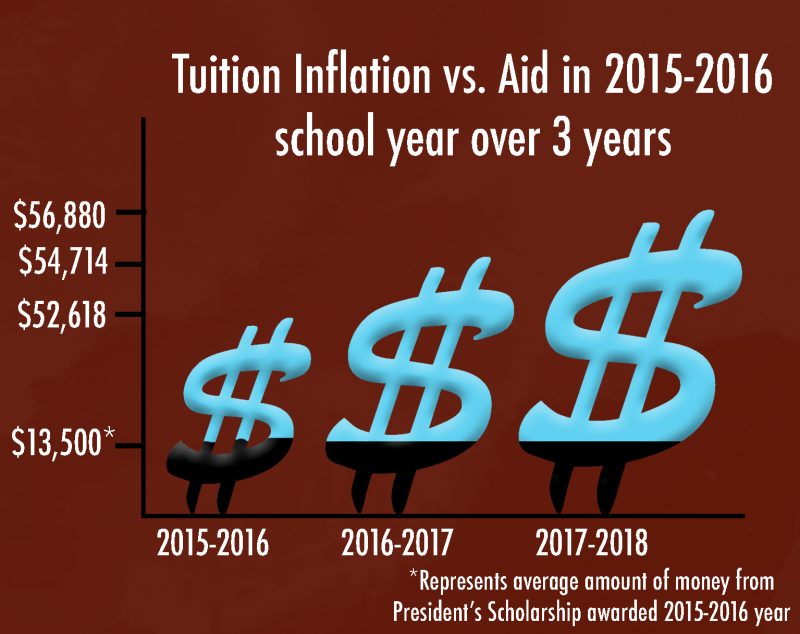Trinity scholarships are determined before students enroll at Trinity. However, once scholarships are awarded to students, the amount is fixed, despite changes in tuition.
According to Eric Maloof, vice president for enrollment management, scholarships are fixed because the university doesn’t have the budget to support increasing aid.
“Trinity’s scholarships are fixed because the university’s expenses increase year over year at a greater rate than our overall revenue, and the vast majority of aid to all students is paid for out of that general operating budget,” Maloof wrote in an email interview.
Scholarships come in two forms: funded and unfunded.
“Funded institutional aid consists of the proceeds of endowed scholarships and annual gifts that were donated to the institution to help students pay a portion of the costs of their educations. Unfunded institutional aid also permits students not to pay portions of their tuition but its funding source is the university’s general operating budget,” Maloof said. “The vast majority of Trinity’s aid to students is funded through the general operating budget.”
The university annually reviews the scholarship amounts for incoming first-year students, and whether the amount changes depends primarily on tuition increase.
“When it comes to scholarships at Trinity, the bulk of decisions are made for a student’s entering year,” said Christina Pikla, associate director of student financial services. “Based on the student’s admission application and where they fall within the pool of applicants, they’re considered for kind of that hierarchy of scholarships.”
According to the Trinity University admission and aid website, there are five academic scholarships which students may qualify for. These are the Trinity Tower, Murchison, Trustee’s, President’s, and Dean’s scholarships.
For most of these scholarships, the amount is set at the time it is awarded and remains the same for the remainder of the student’s time at Trinity.
“The amount of institutional aid a student qualifies for is fixed at the awarded amount for up to eight semesters of undergraduate study,” Pikla said. “There is an erosion of value over time for those merit scholarships that are awarded. The only exception to that is the handful of students that qualify for the full tuition scholarship.”
Maloof explained why scholarships may appear to decrease over time.
“A student’s scholarship does not change over time — the tuition and fees may change, but the scholarship’s amount would stay the same over the four years and the semesters a students stay here,” Maloof said. “The value will decrease as the tuition increases, but the actual scholarship amount stays the same.”
As Pikla mentioned, only the full tuition scholarship’s amount changes over time.
“Of all the academic merit scholarships, they stay flat. There is one exception, which is Trinity Tower Scholars day winners”, Maloof said. “Those who won the full tuition — theirs increases commensurate with the tuition increases. But 99 percent of the academic merit scholarships offered at Trinity will stay flat.”
To continue to receive the scholarships, students must maintain a minimum cumulative GPA, as well as complete 75 percent of the courses that they attempt after the add/drop period. Glendi Gaddis, assistant vice president of student financial services, explained the GPA requirement.
“In general, the minimum cumulative GPA for financial aid eligibility is 2.0 but the scholarships awarded through the Admissions process have a minimum 2.5 requirement. The Trinity Tower Scholarship, which is full-tuition, requires a minimum 3.0 cumulative GPA,” Gaddis wrote in an email interview. “The GPA is monitored at the end of each spring semester to determine if the scholarship can be renewed for the next academic year.”
If a students’ grades suffer enough so that they fall below the GPA level required for their scholarship, the university offers alternatives for financial support.
“When a student falls below the standard, they are considered ineligible for the scholarship. If they demonstrate financial need, the scholarship is converted to Trinity Grant. When this happens, the student doesn’t lose any financial support — just the honor of the scholarship name,” Gaddis wrote. “Students are also given the opportunity to appeal to receive scholarship in a probationary status if there were circumstances beyond their control which prevented them from meeting the minimum requirements.”
Students must be enrolled full-time at Trinity, except under certain circumstances for those in their senior year.
“For students who are seniors that are graduating, in their last semester that don’t need a full time course load to complete, we definitely do consider an exception to the policy for them,” Pikla said.
These scholarships only apply to students in their undergraduate studies, though students may apply for graduate scholarships if enrolled in a program at Trinity.
“There are donors who have established endowments for specific majors and the academic department themselves facilitate those dollars,” Pikla said. “Because of how Trinity is structured with the declaring of majors at the end of sophomore year, typically those dollars are awarded to rising juniors and seniors.”
Some of these scholarships include the Semmes Distinguished Scholars in Science Award, the Baker Duncan Fine Arts Scholarship, Music Scholarships, and Theatre Scholarships.
More information about possible departmental scholarships is available on the Trinity University website, as well as information on how to receive additional financial aid.
While these scholarships are fixed, tuition for students is not and often increases year to year. Maloof explained why this occurs.
“To be a better Trinity tomorrow than we are today takes resources. The largest expenditure at the institution is not only faculty and staff salary and benefits but also financial aid,” Maloof said. “Those numbers increase year over year. To increase the quality and merits of a Trinity education, that costs money, and that’s why we have to increase tuition every year.”
For those interested in where their money goes, these investments include renovations done to dormitories, and other academic buildings such as the Center for Sciences and Innovation and the Bell Center.







